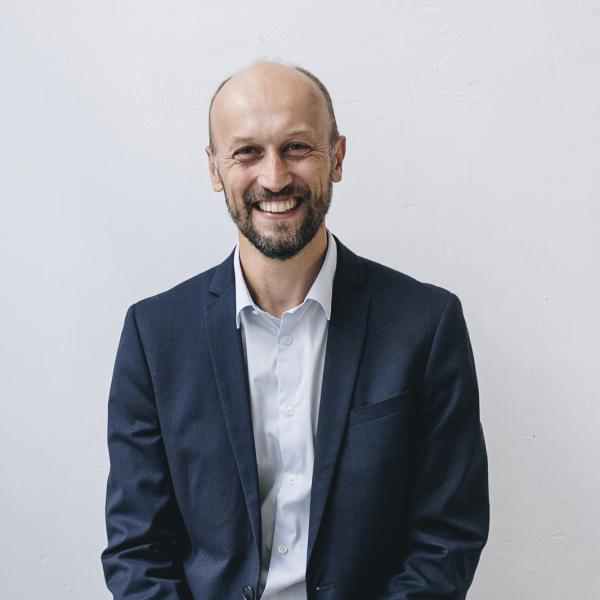Introduction
Due to their poor thermic insulation, 10% of the total energy consumption in France is from individual houses built before 1975. Structuring a large-scale supply solution for thermic renovation, Vincent Legrand is transforming this issue into a social, environmental and economic opportunity.
The New Idea
Contrary to all of the existing efforts focused on incentivizing demand, Vincent is pioneering a large-scale operational approach to structure the supply of thermic renovation for individual houses and to open this untapped market. The DORÉMI solution relies on a two-pronged strategy: 1) train independent builders on sustainable renovation techniques and 2) group them locally to better negotiate with materials’ manufacturers, and package a simple, global renovation offer to homeowners at a reasonable cost. Having an effect on the supply chain, Vincent unlocks the market: builders reduce their costs and are willing to explore sustainable renovation as a new economic opportunity; owners have access to a simplified, reasonable-cost offer; and a maximized environmental impact is generated by replacing incremental renovation with a global renovation process.
Facing the need to reduce energy bills, dependence on fossil energies and greenhouse gas emissions, local authorities are tasked with energy transition but don’t have an operational solution. Vincent engages them to leverage the DORÉMI solution and to scale it. Indeed, by making regional authorities the project owners, he builds trust in the model by guaranteeing its independence from private invested interests. Consequently, he gets buy-in from the various stakeholders – from builders and material manufacturers to home owners. Partnerships with local authorities also enable external stimulation of the demand, while giving Vincent the financial resources and legitimacy to train the builders and oblige them to lower their prices as much as possible. With DORÉMI, regions overcome the complexity of the issue and support a highly efficient solution for the environment, reducing heating consumption by 4 to 6 times.
Positioning DORÉMI as national-scale solution right from the start, Vincent is not only piloting regional testing. At the French and European levels he is demonstrating the economic potential of his solution to shift from our fossil fuels-based model towards renewable energy in order to enact new legislations and achieve energetic transition by 2050.
The Problem
Buildings represent 45% of France’s energy consumption, essentially for heating. More precisely, 10% comes from the 7.4 million individual houses built before 1975 (year of the first regulation on thermic insulation) that dramatically leak energy.
Yet, despite some public policies to incentivize homeowners to improve their houses’ insulation, very few engage in renovations, or when they do, they opt for work on a partial scale.
The process is long, complex and costly for an owner that has to identify five or six different building trades, obtain a reasonable cost estimate, and pilot the work. Besides, despite their existence, the multiplicity and complexity of national and regional subsidies make them quite difficult to access.
On the other side, most builders do not have knowledge and skills in eco-friendly materials and techniques. The few that are certified in energy saving have above market prices and their solutions are not always impactful on the environment – eg: they don’t offer very efficient electric heating. Moreover, these builders are independent - only 15% belong to professional federations. They are not used to working together, so they individually provide part of the renovations without putting their heads together. The few interlocutors they have are construction material producers and suppliers, as well as local public authorities.
The issue of home renovation is also taken into consideration at the political level. Individual houses represent 65% of real estate in France and are a hot topic in the national debate on energy savings. Beyond the environmental crisis, the government faces a growing problem among French citizens: fuel poverty, which affects 3.5 million households who spend more than 10% of their revenues on energy bills. Actions are beginning to see light, as in the current Minister of Housing’s call to renovate 500,000 houses by 2017 and in the creation of regional Information and Service Centers for Renovation. Public subsidies also exist to encourage homeowners to renovate, but they have piled up overtime and the process for attaining them is so complex that are under-used. But all of these initiatives stumble over the supply chain’s lack of structuration. Once again, they can only move forward with step-by-step renovations that cost more in terms of resources.
More advanced in its transition towards a model based on renewable energy, Germany has done the math: €1 invested in thermic renovation generates €2-€4 of fiscal revenues for the State. After the efforts on the demand side, France must now invest in the supply chain for thermic renovation.
The Strategy
Vincent is first structuring trainings for local individual builders. The objective is not only to explain energy-efficient renovation techniques but to empower them, give them legitimacy and build a competitive advantage in the energy transition. Through theoretical and practical sessions performed with strategic partner Enertech, a French reference for energy-saving renovation techniques, Vincent equips the builders to renovate effectively, with an ability to “think global”: work with other builders, set up a collective offer, combine know-how and lower costs.
To maximize the economic and environmental impacts, Vincent focuses the trainings on renovation techniques that do not require a lot of resources in terms of time of manpower, while ensuring simultaneous work on walls, roofs, floor coverings and carpentry.
Vincent’s organization DORÉMI plays a key role as general coordinator. On the builders’ side, DORÉMI ensures follow-up for the trainings and their practical application on sites, but also facilitates the grouping of builders and pilots all the sites, providing financial and technical assistance when needed. On the homeowners’ side, DORÉMI underscores the economic and environmental impact of its solution to convince them to start to renovate their houses, and then simplifies the process by being the unique reference point for all engaged builders. Using a software to facilitate decisions, different options for renovation are combined to obtain a global solution that is financially and environmentally maximized. All the quotations are combined into one single proposal and DORÉMI becomes the group spokesperson.
Creating the conditions for success on both sides, Vincent leverages the renovation market and creates a strong environmental impact with heating consumption cut by 4 to 6 times. For two years, Vincent has focused on experimenting with contents and methodologies for renovation trainings with his partner Enertech, with an impact on 6,000 builders, architects, environmental engineers, and more. In 2012, he launched the pilot for his integrated solution DORÉMI and 70 builders have already been trained and grouped.
The entry point for implementing DORÉMI locally is a partnership with regional authorities. Vincent brings them a turnkey solution for renovation with a high environmental impact, in exchange for their investing resources to coordinate the spread of the model and to pay for part of the trainings and the general coordination by DORÉMI. In addition, keeping his actions focused on the supply chain, Vincent puts his regional partners in charge of the demand by communicating about the solution in their territories. They identify homeowners ready to renovate, as well as support them in accessing existing public subsidies for eco-friendly renovation. Four regions are already engaged and have started testing DORÉMI -Rhône-Alpes, Bourgogne, Alsace and Centre. The different circumstances of these regions - from very urban to deeply rural - enable Vincent to test and pilot his model in varied situations and to come up with adapted methodologies for each territory.
DORÉMI belongs to a non-profit association Négawatt that develops scenarios on the French energy-model transition. Vincent contributed to the latest scenario, which has been acknowledged by the National Agency for Environment and Energy (ADEME). The plan highlights the importance of global renovation in order to achieve the objective of dividing greenhouse gas emissions by 4 by 2050. It also demonstrates the economic opportunity for the State to invest in renovation. Indeed, renovation is profitable and would generate 9 billion euros per year for 30 years, including millions in public taxes.
Parallel to his advocacy efforts, Vincent is developing DORÉMI on his own and with particular attention to the key success factor for its model: building and financing a “train the trainer” model to be able to train builders quickly throughout the territory. Recognition of his trainings in new legislation on energy saving certificates is in progress. He has also seized the opportunity to work with the European Union, which has implemented the program “Build-up Skills” to organize the training of builders in eco-friendly techniques in each European country.
The Person
Vincent is passionate about energy and how we can achieve a system shift. Through his professional and personal experiences, he has gained recognition and legitimacy in the sector. After studying fundamental physics, his first job in the nuclear energy sector in Texas quickly made him realize that an alternative must be found. He quit to complete his studies with a two-year masters degree in sustainable local development, before engaging himself with a major advocacy actor on energy transition: the WISE Agency, the World Info Service on Energy.
In parallel to his work there, he is in the process of renovating his own house himself, showing a growing interest in eco-friendly construction techniques and in discovering this market and its stakes.
After spending three months in India working with the GERES (Group for the Environment, Renewable Energy and Solidarity) on local projects linking renewable energy to society, he began to reflect on the emerging notion of sustainable development. He realized that societies in developing countries sometimes adopt a more sustainable approach to development than those in developed countries.
Back in France, he therefore focuses on projects that link sustainability and local development. He leads several projects involving stakeholders from diverse backgrounds and has great success in making them collaborate, as in the case of the Life Promesse project to preserve natural resources in the South of France. He also works with the WWF on a territorial pilot project on waste management, housing, and transportation issues, which gives him strong knowledge of the sector and reinforces his capacity to mobilize different partners with whom to collaborate.
In 2005, he joined the Negawatt Association, a flagship independent association that builds scenarios to achieve our energy transition. Vincent brought his visionary skills as a volunteer to build the first scenario and to advocate for it with the government. After four years, Vincent pragmatically decided to launch the Negawatt Institute, the operational laboratory of the association. The objective of the Institute is to implement projects and lead field testing to prove the scenario’s relevance, but also to initiate the energy-model shift. It is also a means to consolidate organization’s business model, generating revenue through trainings and local pilots. With the idea of DORÉMI and the thermic renovation of individual houses, Vincent is developing the Institute’s first concrete project with ambitious goals.



